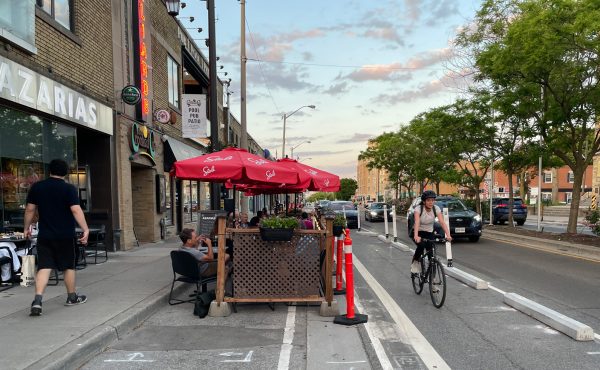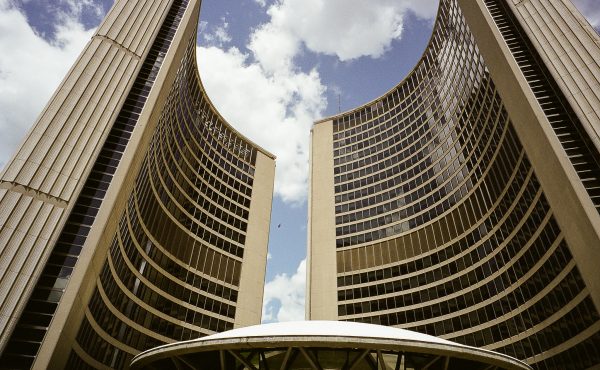
The following is a repost of my Eye Weekly psychogeography column where I look back on the last seven years and say goodbye to Mayor David Miller. The anniversary of the 2003 November night I mention below was actually yesterday, as Miller himself tweeted last night, thanking Toronto for the privilege of being its mayor. Despite doing an undergrad and grad degree in political science, that night was the first time I went to an actual political event of this nature. 2003 was the year the municipal politics bug got in my bed. I wonder if, in some other Toronto, the same thing happened to other Torontonians on October 25th, 2010. Different politics and vision, but same profound personal & public revolutions. Top photo by Rannie Turingan, lower photo by Bitpicture.
![]()
In November of 2003, two friends and I climbed aboard the southbound Spadina streetcar and headed for, what was at the time, the reincarnation of Queen Street’s Bamboo Restaurant on Queens Quay. It was here that David Miller, the come-from-behind candidate, would memorably hold a broom over his head and, with a cracked voice, accept responsibility for Toronto. It was the first political victory party I’ve ever felt compelled to attend, but unfortunately, we couldn’t get into the room — it was packed to capacity. We watched on TVs set up in the nearby Radisson Hotel ballroom.
Toronto was experiencing something of a civic-spirit renaissance the year Miller was elected. This has been documented and explored in many places, including the first volume of Coach House Books’ uTOpia series in 2005 (itself part of that wave), but there was a natural reawakening of love for this city and interest in how it works and how it can work better. It was centred downtown, certainly, but it would be wrong to suggest many folks in the inner suburbs weren’t excited by Toronto, too.
Last year, when Miller announced that he wouldn’t run again, I was heartbroken. I disagreed with the mayor on a number of things (Transit City still needed one or two more subway lines, the plasticky street furniture we’re stuck with for a few more decades is ugly, etc.) and I wished very deeply that he had given more thought to suitable successors, but I believed four more years would see through some of the broader policies he started. Ultimately, what I will miss the most, and why the heartbreak was so palpable, is that Miller came as close as one can possibly get to a philosopher king/queen in Canadian politics. It’s rare to have a politician who can speak of a better city (or country) at the same time as governing it.

Miller himself often had a difficult time communicating his successes, which could be complex and have long-term goals. But Miller’s annual Remembrance Day speeches, given at the cenotaph in front of Old City Hall, were some of the best Canadian speeches of late, with writing approaching West Wing standards (sadly, the fictional TV show set the benchmark for great political writing). He saw Toronto as the living breathing evocation of Canadian values. From 2005:
“More than half of Torontonians come from countries other than Canada. That includes places like Rwanda, Afghanistan, Bosnia, El Salvador, East Timor and dozens of other regions that have been devastated by civil war, terrorism, oppression and genocide. Our city is home to many people who fled armed conflict. Who feared for their lives, and for their children’s lives.”
Seeing Toronto as a site of salvation places it among the great cities of the world. I will also miss having a leader who was involved in (and leading) the growing global-city movement, where cities are becoming transnational players. When Miller was abroad, he represented Toronto in a statesman-like (and, yes, cool) way, leading climate change talks at Copenhagen even as our federal government became the butt of global jokes.
Ambitious plans, like the tower renewal program, that were specifically designed to bring economic opportunity (and green retrofitting) to vast parts of Toronto that have missed out on that wave of civic spirit won’t see results immediately. It’s hard to win elections on anything farther away than tomorrow.
What has been striking about much of the Miller-hate over the past year — over bike lanes or plastic-bag fees — is how small-picture they are. Small is important but, under Miller, Toronto emerged as an almost-alpha global city, one that faces a reluctant transition from a largely postwar, kinda sprawly, sorta sleepy city into a fully urbanized metropolis. Some of Toronto is already alpha, other parts aren’t (and this isn’t an exclusively downtown-suburb divide). It made for a nearly impossibly schizophrenic city to govern. Mayors (and conservative ones at that) such as Boris Johnson in London and Mike Bloomberg in New York are able to do many of the progressive urban things they do because their cities were designed before World War II, and therefore urbanized from their centres to their edges. Neither of those two mayors could have been elected in Toronto last week.
Toronto under Miller will be seen as a test case for so many other cities facing similar challenging divisions, ready to step onto the world stage though they were never built or intended to do so. I’ll miss the leadership he showed, and I’ll lament the missed economic opportunities Toronto would have had with Miller representing us globally. Most of all, I’ll miss hearing him talk about Toronto and Torontonians.
Of course, a final dark cloud here was Miller’s reaction to the G20, an event he didn’t want or ask for. When he told the city to “move on” after widespread allegations of civil rights violations by Toronto police, it was like all those speeches about Toronto being a beacon of freedom and democracy evaporated. It’s hard to be a philosopher king, no doubt, but unless that response can be explained once he’s out of office, this too will be part of his legacy.




11 comments
When I first heard of Miller’s decision to not run for a third term, my intial reaction was also one of disappointment, as well as fear. Would Transit City still proceed? There was some initial hope with Giambrone, however that quickly fell apart. Fast forward to today, and the unfortunate reality is that Transit City seems to be in for a bumpy ride at best, or doomed at worst. Not that it is perfect, but after decades of doing nothing, Transit City was a welcome initiative. And best of all, it could be completed in relatively short order. Now, not only may we never see it built, we may even start to see our legacy streetcar network chipped away and slowly dismantled. Truly sad.
Lovely. Thanks so much for writing and posting this Shawn. It feels like the collective sigh so many of us (i think?) are experiencing as these final days pass…
To make many of Mayor Miller’s proposals happen, he needed to persuade 22+ other members of city council to go along with him. Can Mayor-elect Ford do the same, get 22+ other Councilors to go along with him?
Great article. This is important: “Some of Toronto is already alpha, other parts aren’t (and this isn’t an exclusively downtown-suburb divide).”
Toronto’s division isn’t along urban/suburban lines. Show me that colour map of how people voting, but there are many shades, and plenty of people approved of Toronto’s direction with a passion in the suburbs. Many of Toronto’s suburban communities have become very diverse. Some even look and function like downtown–North York Centre being a case in point or are getting there, like Scarborough and Etobicoke’s centres. Those living in dense high-rise communities in suburbia might have not been moved so much by the war on cars fairy tale.
“Miller came as close as one can possibly get to a philosopher king/queen….”
This was exactly to problem. Miller was too preoccupied with his grandiose visions of Toronto’s image to the world and totally neglected it’s ability to function as a home for the electorate. Miller’s Toronto was little more than a facade of green roofs, bike lanes and art projects. Behind the facade the city decayed. Miller was obsessed with term ‘world class city’. He failed to understand it is the quality of life, the ability to live, work and raise a family, that is the true foundation required to be build a world class city. Miller was all about window dressing but for the people of Toronto he was only offering cheap suits at inflated prices.
Examples, DDM, give us examples of decay AND then an absence of work on that decay. Can you do that?
Here Shawn,
http://www.td.com/economics/special/sg1010_toronto.pdf
http://www.unitedwaytoronto.com/Poverty-by-Postal-Code/main.htm
http://www.thestar.com/SpecialSections/VitalSigns/article/261656
http://www.fraserinstitute.org/WorkArea/DownloadAsset.aspx?id=3111
http://www.thestar.com/Business/article/449411
etc.
Also, I would like to know, while you are lamenting about ‘missed economic opportunities Toronto would have had with Miller representing us globally’, what about the missed economic growth we missed locally?
I thought you didn’t approve of just posting links? I’ll keep lamenting about global opportunities in the mean time.
It’s true, leading a mixed up city like T.O. is not easy, but Miller was not a good mayor except in the minds of his cheerleaders. The complete lack of sensitivity to any group that had an opposing point of view to his “agenda” has probably set the set the “progressive” cause back at least 10 years. Yes, he had “vision”… but that’s only part of what’s needed. You also have to be able to “implement” that vision in an effective manner palatable to the electorate… which of course Miller proved himself unable to do. Nice try but good riddance. (And no, I don’t like Ford — I actually voted for Miller in the past.)
And with respect to anyone suggesting Miller as a philosopher-king, Plato is no doubt turning in his grave.
Here is another one reported in the Star..
Toronto families slip into poverty
http://www.thestar.com/News/article/279839